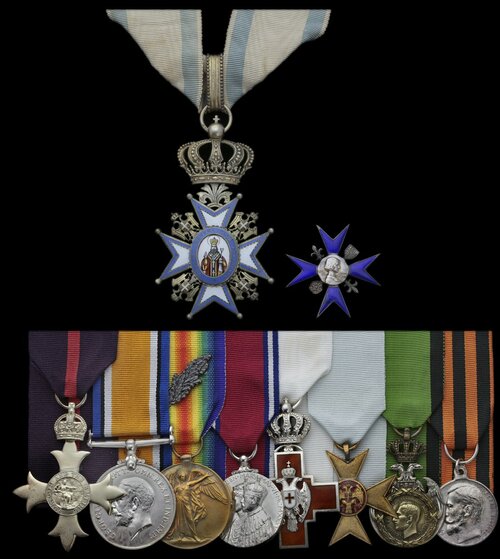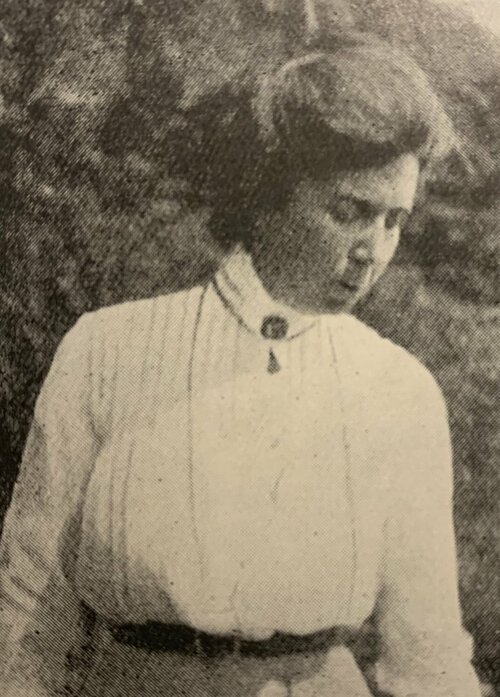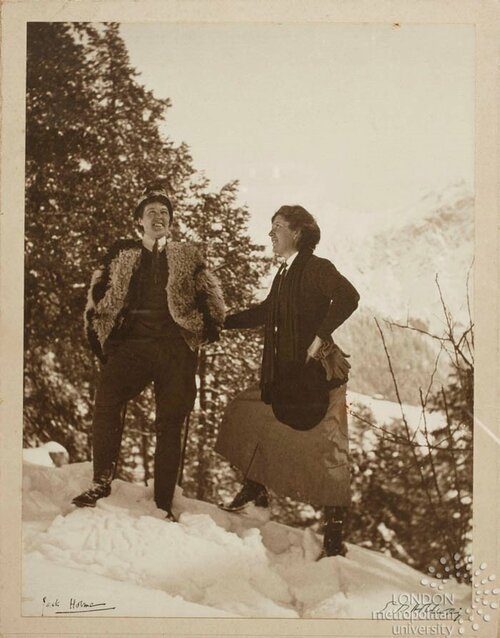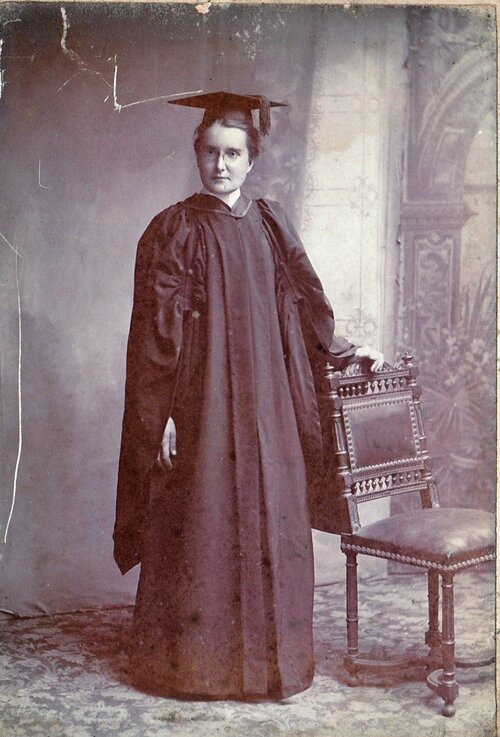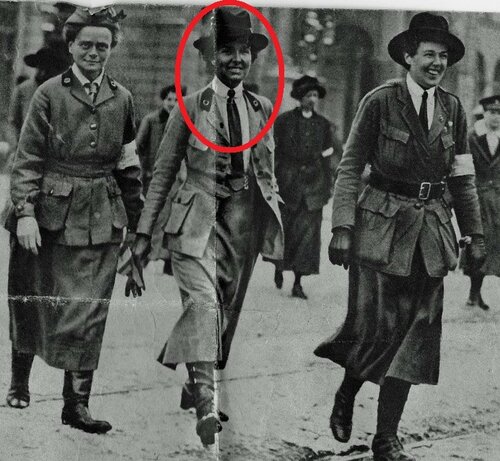Auction: 22001 - Orders, Decorations and Medals
Lot: 330
A rare Great War Balkans O.B.E. group of nine awarded to Dr E. B. Hollway, First Serbian Hospital Unit, Scottish Women's Hospitals, Royal Army Medical Corps & French Red Cross, a female Surgeon who was widely decorated by the Serbs for her work during the Great War Kragujevatz
The Most Excellent Order of the British Empire, O.B.E. (Military) Officer's 1st Type breast Badge, silver-gilt, hallmarks for London 1919; British War and Victory Medals, with M.I.D oak leaves (E. Hollway.); Jubilee 1935 (Dr Edith B. Hollway.), engraved naming; Serbia, Kingdom, Red Cross Order; Serbia, Kingdom, Balkan Wars Cross; Serbia, Kingdom, Retreat from Albania Medal; Russia, Imperial, St George Medal for Bravery, Nicholas II, 4th class, silver, the reverse numbered ‘1032767'; Serbia, Kingdom, Order of St Sava, Commander's neck Badge, Bishop with red robes; together with her sister's Nightingale Nursing School Badge, the reverse engraved 'Elsie K. Hollway', silver and enamel, good very fine and a rare combination (10)
O.B.E. London Gazette 3 June 1919:
'In recognition of valuable services rendered in connection with Military Operations in the Balkans, and with the Army of the Black Sea.'
M.I.D. London Gazette 28 November 1917 & 11 June 1920 (Salonika).
Edith Blake Hollway (sometimes spelt Holway, or Holloway) was born at Pinner, Middlesex on 30 November 1874 and qualified at the London School of Medicine for Women in 1906. Upon the outbreak of the Great War she working as a Surgeon at the Temperance Hospital, Hampstead and is listed under two Medal Index Cards. The first notes her entry into Serbia in December 1914 with the French Red Cross, whilst the second gives 2 January 1915, serving with the Scottish Women's Hospital. Either way, the Record of the Scottish Women's Hospitals confirms she went out as Surgeon for the First Serbian Hospital Unit, which arrived at Kragujevatz on 6 January 1915. They totalled just 5 female Doctors and immediately had some 150 wounded Serbian soldiers to tend to, suffering dreadful limb damage, frostbite and gangrene. They swiftly assembled a Hospital of 150 beds, with a convalescent home for a further 90 patients as required. Moreover, a deadly typhus outbreak occurred in February, which took the lives of no less than three of her Nurses. She herself fell ill in April, with the treatment she recalled:
'...one soon gets rather muddle-headed and drowsy which is increased fourfold by the amount of intoxicating liquor that is poured down one's throat, or neck. I was perfectly drunk for ten days and was getting quite fond of whiskey.'
Having spent some time at that place, in August 1915 the unit moved to Lazarevats, with Hollway and Mrs Haverfield going as a forward party to get the place established. They were forced to make the 100-mile journey to Kruevac in truly awful conditions, the roads strewn with the frozen bodies of men, women and children who did not pull through. Their makeshift dressing station was established in a storehouse. More worrying issues further circled with Serbia now standing alone with the Central Powers pushing forth. One day they heard the voices of Austrians, they were now Prisoners of War. By February they were eventually re-patriated, via Bludenz, Zurich and thence back to France. She is noted as having remained in the theatre till March 1916, being issued a grant of £25 for the loss of personal property and medical equipment in Serbia.
However, she is thence listed as having gone out to Ajaccio, Corsica as Assistant Medical Officer the following month. She remained at that post until August 1916, when a position with the Royal Army Medical Corps became available.
Returned home in September 1916, she proceeded to Malta and onto Salonika in 1917. She was part of the Women's Medical Unit, established by Louisa Aldrich-Blake, which was mobilised as No. 62 General Hospital for Salonika. The Women Doctors were L. J. Murphy, A. G. Fergus, M. D. Murray, R. L. H. Davy, E. T. Gilchrist, E. S. Walker, M. J. Ahern, and E. B. Hollway. Hollway clearly saw much active service during the Great War and is a pioneering female Doctor in the Medical Services. After the conclusion of the Great War, she conveniently forgot the fact her contract had long expired, despite still working in Constantinople in the Spring of 1921. Her award of the O.B.E. appears to be the only such award to the Women Doctors of her unit, which was considered '...a good choice' by Dr Edith Guest She died at Teignmouth Hospital on 26 December 1948, having retired to St Anthony, Bishopsteignton; sold together with original N.U.W.S.S. Great War roll, which includes an image of Hollway and a quantity of copied research.
Medal Roll confirms only a Pair issued. 1935 Jubilee Medal issued whilst In Charge of the Dufferin Hospital, Betiah.
Subject to 20% VAT on Buyer’s Premium. For more information please view Terms and Conditions for Buyers.
Sold for
£7,000
Starting price
£1800

